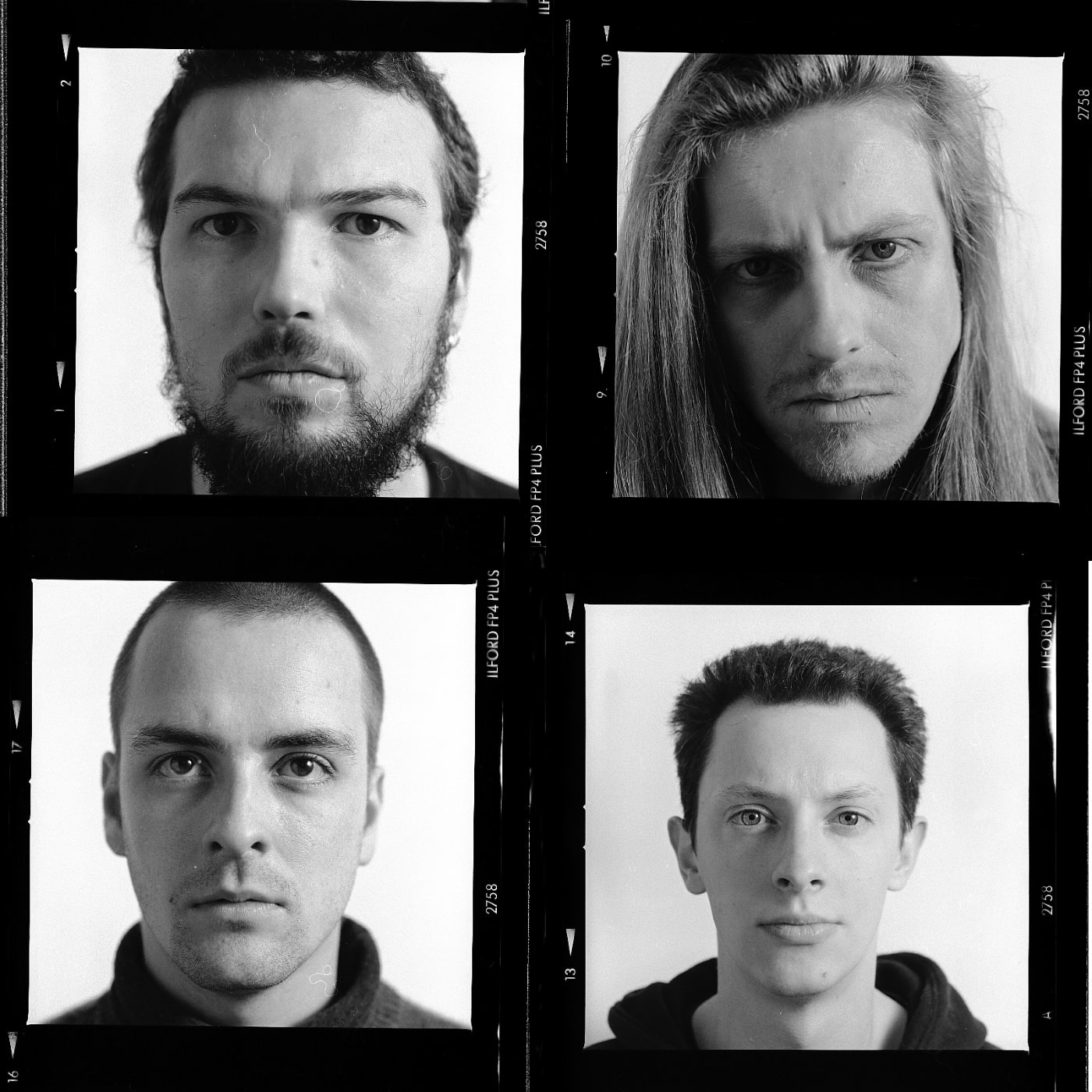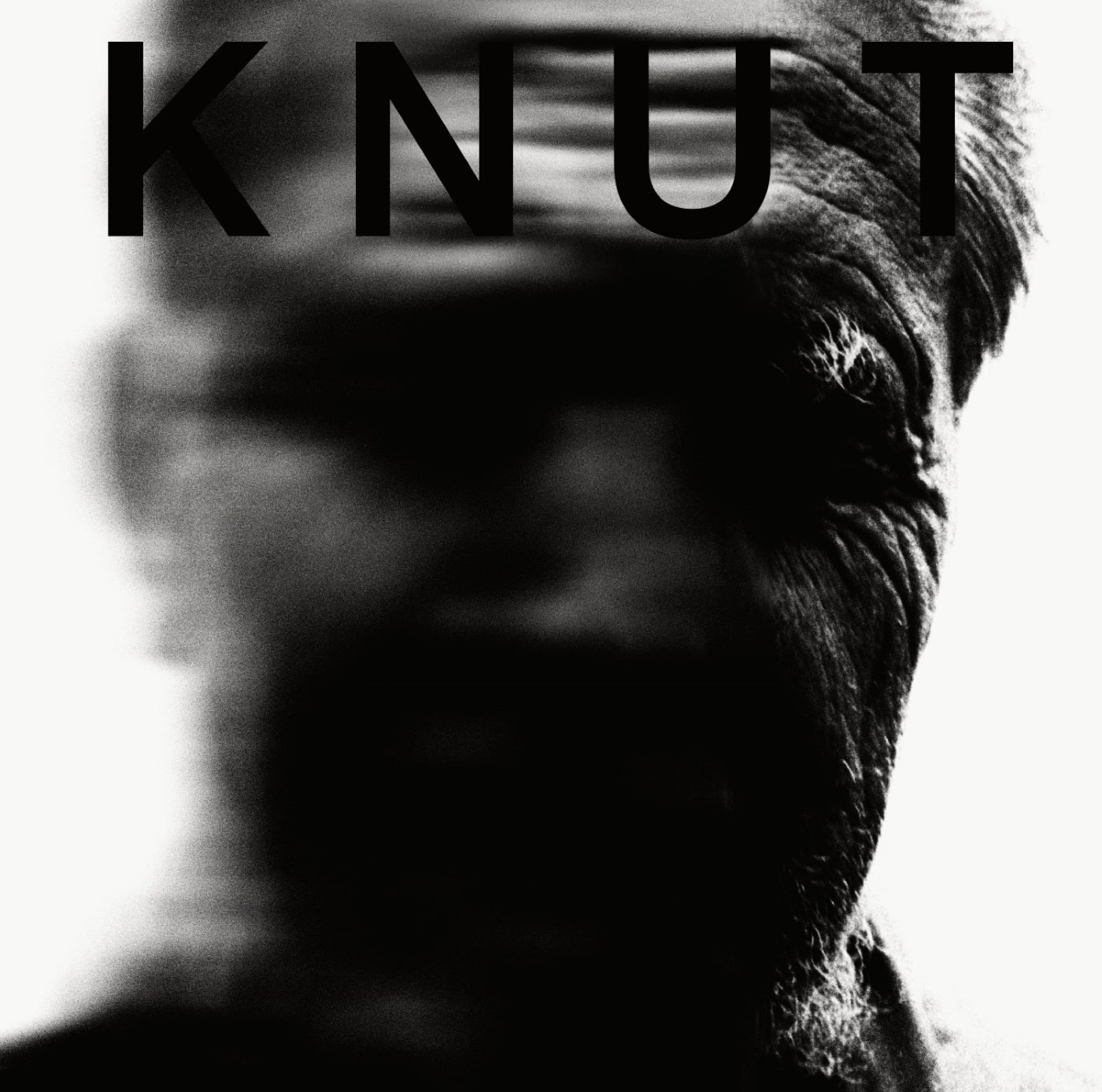It is easy to assume that the soul of Swiss noise aggressors KNUT’s sound is tortured and twisted, indeed little else fits the aggression and turbulence of its voice but it is a turmoil which breeds clamorous symphonies and records which devour and corrupt and in their own infernal way, seduce. The moment when the cacophonous siren call of their music truly took the world was the release of debut album, ‘Leftovers’. It was an aural trespass which challenged and assaulted the senses, rising in the wake of the diversity of noise fuelled bands such as Today Is The Day, Godflesh, The Young Gods, Melvins, Helmet and Eisenvater to leave its own indelible mark on the evolution of noise. Now the increasingly recognised seminal encounter has a long-awaited re-release on the much deserved vinyl format for the very first time through the equally inimitable Hummus Records. To celebrate, we’re giving you a special first hearing of the remastered version of the album’s first track “Shine”, along with our special interview with KNUT, who sat down with us to recall their rich experience, look back at their legacy and discuss the new release, available for pre-order via Hummus Records.
Geneva in early 1994 saw the coming together of four men with a rich diversity of musical backgrounds. Even so they were united in a love of sonic clamour and in league the foursome of vocalist Didier Severin, guitarist Philippe Hess, drummer Roderic Mounir and bassist Thierry van Osselt (who would leave and be replaced by Jeremy Tavernier by the time of the band’s third album) entangled and forged the most compelling essences of metal, hardcore, and raw noise aggression for an invasive proposition which was ravenously intense, physically unrefined and inescapably gripping. Several 7” releases were uncaged as the band took the D.I.Y route before forming their own label, Snuff Records, to release the attention bruising ‘Leftovers’ in 1997 to be followed a year later by its acclaimed successor ‘Bastardiser’.
Subsequent years have seen Knut release a trio of albums through prestigious Boston label HYDRA HEAD (Cave In, Botch, Coalesce, Keelhaul, Drowningman), and tour the world alone and alongside a host of renowned peers, their reputation and sound only increasing in acclaimed clamour yet ‘Leftovers’ still grips a momentous place in the band’s history and that of feral creativity. Self-produced and mixed by David Weber, the seven track invasion preys on weaknesses within the psyche; vehemence soaking the violence of its sonic howl as primal grooves tunnel through the body like carnal vines. Yet as rhythms simultaneously abuse and invigorate while riffs gnaw ravenously at the senses there is a Tartarean beauty which cannot be escaped.
Continued below…
Undoubtedly Knut have proceeded to unleash encounters and tracks which have strikingly twisted and persistently re-ignited the landscape of noise but there is an indefinable essence about ‘Leftovers’ which has maybe been built upon and evolved but never quite emulated again. Like the band’s fans Hummus Records recognise that irresistible quality and open the door on the cage of the innovative beast to once more let it loose on the world.
My soul is a hidden orchestra; I know not what instruments, what fiddlestrings and harps, drums and tamboura I sound and clash inside myself. All I hear is the symphony.” Fernando Pessoa, ‘The Book of Disquiet’.
Check out the new, remastered versionof the album’s opener “Shine” and see the full interview below. Answers by Roderic Mounir (drums, composition) and Didier (vocals, lyrics).
Hey guys! First off, thank you so much for taking some time with us. How are you? How has this weird year been treating you so far?
Roderic: It’s been weird to say the least. The whole world seems to be going down but I woundn’t complain too much, living in one of the world’s richest and most stable countries. Right now, besides the global political and environmental disasters, the inability for bands to tour and live off their art is also alarming. How many people are expected to turn away from arts and culture in the current situation, choosing a safer and more sustainable life? It’ll be a huge loss.
Didier: When the Covid crisis hit Switzerland, it was a nightmare. I had a residency and a tour planned for my current project strom|morts. Of course, everything was cancelled. Since then we have been able to rebound with a remote collaboration program where we release one collaboration a month for a year. We’ve been able to play 4 shows this year, but I’m not sure if we’ll be able to play the one programmed for mid-December. Time to head back to the studio & record new stuff.
You announced your indefinite hiatus almost 9 years ago. What prompted you guys to make this, I imagine, tough decision back then? What made KNUT disappear?
R: We came to the conclusion that all was said and done. Twenty years, five albums and touring the world isn’t bad, considering we never did this on a professional level. We underwent several line-up changes through the years, with the obvious impact on internal dynamics and musical direction. Personal lives and motivation also changed and affected the band. Looking back, it would be be safe to say that our creative peak was reached somewhere around the Challenger and Terraformer albums.
In this lengthy time off from the band, what has been keeping you busy?
R: I’ve been working as a music journalist, living my life, doing a new project called Brutalist for a few years (more noise, less metal), which is now defunct and involved some later-era Knut members. Some other things too, but I’m done with metal as a player.
D: Life, kids, moving to the Alps and going down the rabbit hole of modular synthesizers. I’ve been involved in two different projects since Knut: Llama/Olo and strom|morts.
Looking back at your debut album, what’s your favourite memory of its journey? Have you learned anything recently from revisiting your debut offering?
R: First of all I’m grateful that some people still give a shit about our records, enough to put energy and money into reissues. Regarding the music itself, mixed feelings. The Bastardiser album from 1998 which was reissued on vinyl last year, sounds to me like a concrete step towards a fully realized sound, a statement still relevant today. With Leftovers I tend to focus on the naive, flawed aspects, although the material has its strengths, being candid and eclectic as it is. I was actually surprised by how metal it was, crossed with our hardcore and noiserock tendencies. We had the ability to blend those Godflesh, Zeni Geva, Helmet, Swans influences with extreme metal. We’re talking 1996, and it was not something you’d hear a lot.
D: Really proud of the Knut journey in general. This debut album was us learning everything at the same time, how to play together, compose and arrange, learning everything about recording ourselves with the state of the art equipment that were ADATS at the time, and group dynamics in general.
The 90s were one of the most fascinating decades in rock, metal, independent, still heavily evolving music, widening and on the other hand bridging the gap between many genres and creating a unique memory for all of the artists, fans, live shows attendees, and participants of music communities. Give us some of your memories from that time.
R: A unique decade for underground music, no question. Tons of labels, mags, fanzines and distros to help quench our thirst. We were totally a product of those years, the DIY ethos of punk meeting the extreme sonics of extreme metal, industrial, noise… We took part in this very exciting period by spending most of our time in basements playing or watching shows, starting our own label (Snuff Records), doing a distro and a fanzine (Evil), exchanging advice with activists from all over the world, organizing shows too.
D: The 90’s were really exciting, I was a student and it was the time of all these great music discoveries. The internet was not shaping the world yet, you pretty much always discovered new stuff through other people. It was a great time for small labels, bands and zines in general.
For a still young band, touring with Converge, Botch, Pelican, and more highly influential bands must have been a surreal experience. Tell us a bit about your touring experience with those greats and how it impacted you both as artists and personally.
R: We were the same age as the guys in Converge and Botch, maybe even a bit older than them actually. But they were obviously more active, professional and influential than us – you can’t compare the United States and Switzerland in terms of size and cultural impact. Anyway, we were super excited to play with them. We only did a handful of shows together but we got along really well. Both bands mentioned us to Hydra Head moguls Aaron Turner and Mark Thompson back home. The rest is history. Watching those bands play had a big impact on us in terms of live energy and musical direction – more chaotic and less rigid.
Looking back at the whole history of the band, what chapter or experience has been your favorite or the most rewarding?
D: Definitely touring with great bands, meeting your personal heroes, see awesome shows every night while on tour, a sense of adventure and freedom you cannot grasp if you have not lived it.
R: Our US tour in Summer 2001 with Isis and Thrones is an absolute standout. I shall also mention a concert in France in 1999 with Voivod, Neurosis, Botch and our friends Ananda. Being able to talk to Voivod’s late guitarist Piggy was a huge moment for me. I also loved touring several times with our friends Keelhaul, or visiting remote areas of Eastern Europe with Monno in 2007. Also, all the time spent in studio creating records like Challenger or Terraformer was super intense, challenging and self-transcending.
Alright, so here we are in 2020, awaiting an unexpected re-release of your debut recording. Tell us about the idea behind the new edition of “Leftovers”, how you’re satisfied with the remaster and what we can expect from the re-release?
R: Unexpected, you’re absolutely right. Hummus Records is responsible for it, with Lad Agabekov (Nostromo bass player) who handled remastering. Being that the album was self-produced and recorded in the mid-90s, it’s surprising that it hasn’t aged so badly. That said, the remastering boosts lower frequencies, giving it more balls without altering the nature of the recording. Not sure what to expect from this reissue, it may give people an insight into a sound in formation. That’s where it all begins, obviously far from Challenger but on a route that leads to it.
Aren’t you tempted to put out some new music? Apart from this re-release, can we expect something more in the coming months?
R: No unreleased material to expect, but probably a few more reissues.
Thank you so much for your thoughts and precious insights. Feel free to add your final words, recommend some new artists worth a listen, or anything you feel we missed here. Cheers from Warsaw!
D: Never forget death, now is the time.
Please consider donating to IDIOTEQ to keep this magazine going
💉 With no-ads policy and mission to give independent artists space they deserve, IDIOTEQ is a place to get inspired, learn more about lesser known artists and their perspective. Reporting on DIY music is our priority.
𝖯𝗅𝖾𝖺𝗌𝖾 𝖼𝗈𝗇𝗌𝗂𝖽𝖾𝗋 𝖽𝗈𝗇𝖺𝗍𝗂𝗇𝗀 𝗍𝗈 𝗁𝖾𝗅𝗉 𝗐𝗂𝗍𝗁 𝖼𝗈𝗏𝖾𝗋𝗂𝗇𝗀 𝗈𝗎𝗋 𝖼𝗈𝗌𝗍𝗌 𝖺𝗇𝖽 𝗄𝖾𝖾𝗉 𝗍𝗁𝗂𝗌 𝗉𝗋𝗈𝗃𝖾𝖼𝗍 𝖺𝗅𝗂𝗏𝖾
DONATE via PayPal 𝗈𝗋 SUPPORT via Patreon
100% of the funds collected go toward maintaining and improving this magazine. Every contribution, however big or small, is super valuable.














